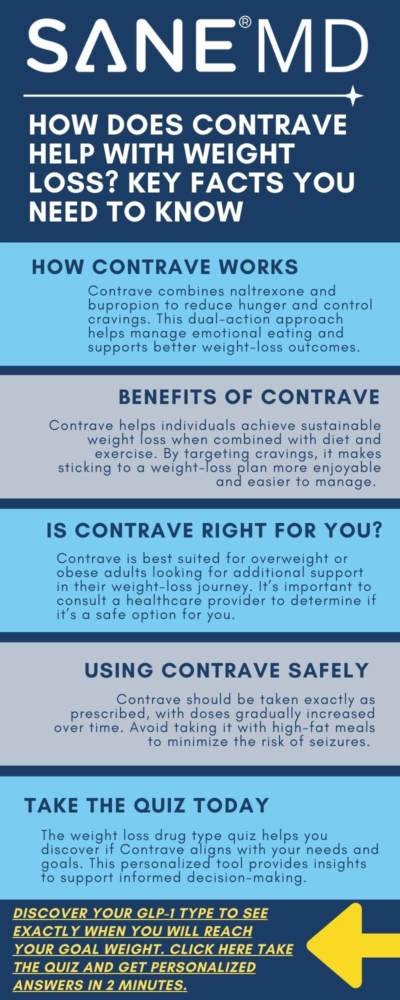Can Contrave Help You Lose Weight? Take the Quiz Today!
Dr. Matthew Olesiak, MD, is the Chief Medical Director at SANESolution, a renowned wellness technology company dedicated to providing evidence-based solutions for optimal living. Dr. Olesiak earned his medical degree from the prestigious Jagiellonian University Medical College in Kraków, Poland, where he developed a strong foundation in medicine.
Losing weight can be a challenging journey, often requiring a combination of lifestyle changes, willpower, and support. For many, achieving and maintaining weight loss can feel overwhelming, especially when hunger and cravings persist. Contrave, a prescription weight-loss medication, offers a potential solution for those struggling to shed excess weight. Contrave is approved by the Food and Drug Administration (FDA) for weight loss. But does Contrave work for weight loss?
To help you determine if Contrave is the right fit for your weight loss journey, we’ve prepared this guide. You can also take the weight loss drug type quiz, which provides personalized insights into the best options based on weight loss goals and other factors. This article explores Contrave’s mechanisms, benefits, risks, and safe usage practices, equipping you with the knowledge needed to make informed decisions.
Key Takeaways
- Contrave combines naltrexone bupropion to target hunger and cravings in the brain.
- It is most effective as part of a comprehensive weight-loss program, including diet and exercise.
- A weight loss drug type quiz can help you determine if Contrave is a suitable option.
What is Contrave (Naltrexone Bupropion) and How Does it Work?
Mechanism of Action
Contrave is a combination medication that includes naltrexone and bupropion, two drugs traditionally used for other purposes. Naltrexone is commonly prescribed to manage addiction, while bupropion is an antidepressant that can also assist with smoking cessation. Bupropion is also used to treat depression, adding a psychological benefit to the medication. Together, they work on the central nervous system and areas of the brain involved in regulating hunger and cravings.
Contrave’s mechanism aims to reduce the constant drive to eat by influencing two key brain areas: the hypothalamus, which controls appetite, and the mesolimbic reward system, which influences cravings. This dual-action approach can help individuals reduce their food intake and resist emotional eating triggers.
If you’re unsure whether Contrave aligns with your weight-loss needs, the weight-loss drug type quiz can provide valuable guidance.
Can Contrave Help You Lose Weight?
Clinical studies show that Contrave can assist your weight control efforts with the following actions:
Effective Weight Loss Results
Contrave has been shown to help individuals achieve sustained weight loss when used as part of a comprehensive plan. Clinical trials have demonstrated its potential to assist with shedding pounds and maintaining results over time.
Studies suggest that individuals using Contrave experience greater weight loss compared to those relying solely on diet and exercise. By taking the weight loss drug type quiz, you can determine whether Contrave’s benefits match your goals.
For those asking, ‘Is Contrave the best weight loss solution’, clinical studies suggest that it can be effective when combined with diet and exercise.
Reduced Cravings and Emotional Eating
One of Contrave’s strengths is its ability to address emotional eating and cravings. Emotional eating is a significant barrier to weight loss for many individuals, often leading to overeating or choosing unhealthy foods.
Contrave helps to curb these tendencies, offering a pathway to better control over eating habits. By tailoring treatment to individual needs, including emotional triggers, Contrave users may experience improved weight-loss outcomes. Users should monitor for symptoms of low blood sugar, especially if they have diabetes.
How Contrave Supports a Reduced-Calorie Diet
For Contrave to be effective, it must be combined with a reduced-calorie diet and increased physical activity. The medication helps users adhere to their diet plans by reducing hunger and making it easier to avoid overeating.
In the long term, Contrave encourages sustainable lifestyle changes, such as healthier eating patterns and regular exercise, which are crucial for maintaining weight loss.
Potential Side Effects and Risks
Common Side Effects
As with any medication, Contrave may cause side effects. Commonly reported issues include:
- Nausea, constipation, and headache
- Dizziness, insomnia, and dry mouth
- Serious skin reactions, such as blistering and a severe skin rash
These side effects are typically mild and may subside over time as the body adjusts to the medication. However, if these symptoms persist or worsen, it is important to consult your healthcare provider.
Serious Side Effects
Although rare, serious side effects can occur with Contrave, including:
- Serious allergic reaction
- Seizures or suicidal thoughts
- Liver damage and significant mood changes
Seek immediate medical attention if you experience any of these symptoms. It’s crucial to weigh the benefits and risks of Contrave with your healthcare provider before starting treatment.
Who Should Not Take Contrave
Contraindications
Contrave is not suitable for everyone. You should avoid using this medication if you:
- Have uncontrolled high blood pressure or a history of seizure disorders
- Are currently dependent on opioids or have recently stopped using them
- Are pregnant, breastfeeding, or planning to become pregnant
Always discuss your medical history with your healthcare provider before starting this or any medication.
Important Safety Information
Interactions with Foods and Medications
Contrave can interact with certain foods and medications, which may affect its efficacy or increase the risk of side effects. Here are some important interactions to be aware of:
- High-fat meals: Taking Contrave with high-fat meals can increase the risk of seizures. It’s recommended to avoid taking Contrave with high-fat meals.
- Medications: There are several drug interactions to be aware of. Contrave can interact with certain medications, such as monoamine oxidase inhibitors (MAOIs), and increase the risk of serious side effects. Inform your doctor about all medications you’re taking, including over-the-counter (OTC) medications and herbal supplements. This also includes alcohol intake, as Contrave and alcohol drug interactions can be serious.
- Foods: Grapefruit and grapefruit juice can increase the levels of bupropion in your blood, which may increase the risk of side effects. Avoid consuming grapefruit or grapefruit juice while taking Contrave.
How to Use Contrave Safely and Effectively
Dosage and Administration
The typical starting dosage for Contrave is one tablet daily, with the dose gradually increasing to two tablets per day during the second week. In the case of a missed dose, wait until your next scheduled dose. Never take a double dose. It’s important to take Contrave exactly as prescribed and to avoid taking it with high-fat meals, which can increase the risk of seizures.
Following your healthcare provider’s instructions closely will ensure the safest and most effective use of the medication.
Monitoring and Follow-Up
Regular follow-up appointments with your healthcare provider are essential while taking Contrave. During these visits, your provider will monitor your:
- Blood pressure
- Overall health and response to the medication
- Symptoms of low blood sugar, especially if you have diabetes
Adjustments to your treatment plan may be necessary to optimize results and address any concerns.
Talking to Your Doctor
Before starting Contrave, it’s essential to discuss your medical history and any concerns you may have with your doctor. Here are some topics to discuss:
- Medical conditions: Inform your doctor about any medical conditions you have, including high blood pressure, high cholesterol, or type 2 diabetes.
- Medications: Tell your doctor about all medications you’re taking, including OTC medications and herbal supplements.
- Allergies: Inform your doctor about any allergies you have, including allergies to naltrexone or bupropion.
- Pregnancy and breast-feeding: Contrave is not recommended for pregnant or breastfeeding women. Inform your doctor if you’re pregnant or breastfeeding.
- Mental health: Contrave can increase the risk of suicidal thoughts and behaviors, especially in people with a history of depression or bipolar disorder. Inform your doctor about any mental health conditions you have.
Engaging in these discussions with your doctor ensures that Contrave is both safe and effective for your specific needs.
Frequently Asked Questions (FAQ)
Many individuals have questions about how Contrave works and whether it is the right choice for their weight-loss journey. Below are answers to some of the most common queries.
1. What is Contrave used for?
Contrave is a prescription medication designed to aid in weight management for overweight and obese adults, specifically those with a body mass index above a certain threshold. It is intended for use alongside a reduced-calorie diet and regular exercise to enhance weight-loss outcomes.
2. How soon can I expect results with Contrave?
Results vary from person to person. Many users report noticeable weight loss within the first few months of consistent use. The key is combining Contrave with healthy eating and physical activity to maximize results.
3. What are the common side effects of Contrave?
Common side effects include nausea, headache, constipation, and dizziness. While these symptoms are often temporary, it is important to inform your healthcare provider if they persist or become bothersome.
4. Can anyone take Contrave?
Contrave is not suitable for everyone. Individuals with certain health conditions, such as uncontrolled high blood pressure or a history of seizures, should avoid taking this medication, as they are at an increased risk of complications.
5. Is Contrave a standalone solution for weight loss?
Contrave is not a standalone solution. It works best as part of a comprehensive weight-loss program that includes dietary changes, regular physical activity, and behavioral adjustments. Combining it with personalized medical guidance and lifestyle modifications enhances its effectiveness for sustainable weight management.
Conclusion
Contrave offers a potential pathway to effective weight loss for those struggling with hunger and cravings. However, it is most effective when combined with a healthy lifestyle and used under the guidance of a healthcare provider.
To explore whether Contrave might be right for you, consider taking the weight loss drug type quiz and consulting your doctor to create a personalized weight-loss plan tailored to your needs. Contrave is approved by the Food and Drug Administration (FDA) for weight management.





